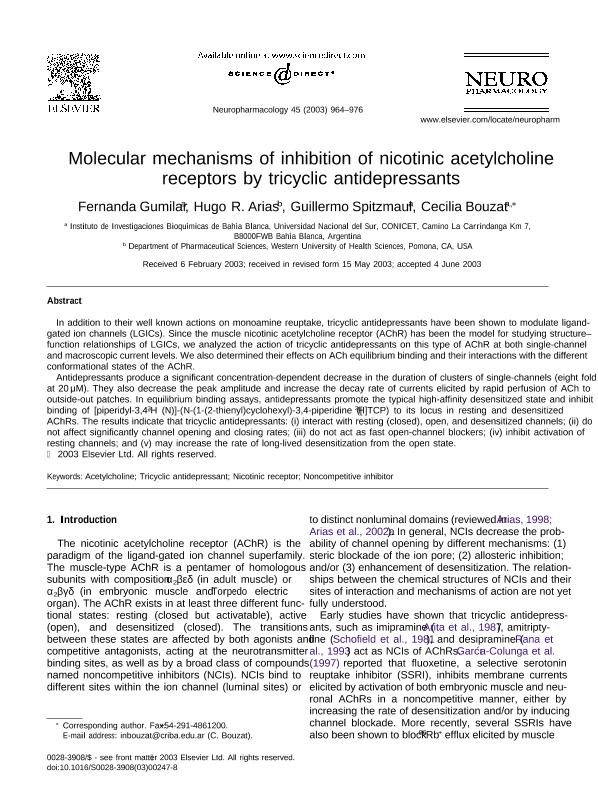Artículo
Molecular mechanisms of inhibition of nicotinic acetylcholine receptors by tricyclic antidepressants
Gumilar, Fernanda Andrea ; Arias, Hugo Rubén
; Arias, Hugo Rubén ; Spitzmaul, Guillermo Federico
; Spitzmaul, Guillermo Federico ; Bouzat, Cecilia Beatriz
; Bouzat, Cecilia Beatriz
 ; Arias, Hugo Rubén
; Arias, Hugo Rubén ; Spitzmaul, Guillermo Federico
; Spitzmaul, Guillermo Federico ; Bouzat, Cecilia Beatriz
; Bouzat, Cecilia Beatriz
Fecha de publicación:
12/2003
Editorial:
Pergamon-Elsevier Science Ltd
Revista:
Neuropharmacology
ISSN:
0028-3908
Idioma:
Inglés
Tipo de recurso:
Artículo publicado
Clasificación temática:
Resumen
In addition to their well known actions on monoamine reuptake, tricyclic antidepressants have been shown to modulate ligand-gated ion channels (LGICs). Since the muscle nicotinic acetylcholine receptor (AChR) has been the model for studying structure-function relationships of LGICs, we analyzed the action of tricyclic antidepressants on this type of AChR at both single-channel and macroscopic current levels. We also determined their effects on ACh equilibrium binding and their interactions with the different conformational states of the AChR. Antidepressants produce a significant concentration-dependent decrease in the duration of clusters of single-channels (eight fold at 20 μM). They also decrease the peak amplitude and increase the decay rate of currents elicited by rapid perfusion of ACh to outside-out patches. In equilibrium binding assays, antidepressants promote the typical high-affinity desensitized state and inhibit binding of [piperidyl-3,4-3H (N)]-(N-(1-(2-thienyl) cyclohexyl)-3,4-piperidine ([3H]TCP) to its locus in resting and desensitized AChRs. The results indicate that tricyclic antidepressants: (i) interact with resting (closed), open, and desensitized channels; (ii) do not affect significantly channel opening and closing rates; (iii) do not act as fast open-channel blockers; (iv) inhibit activation of resting channels; and (v) may increase the rate of long-lived desensitization from the open state.
Archivos asociados
Licencia
Identificadores
Colecciones
Articulos(INIBIBB)
Articulos de INST.DE INVEST.BIOQUIMICAS BAHIA BLANCA (I)
Articulos de INST.DE INVEST.BIOQUIMICAS BAHIA BLANCA (I)
Citación
Gumilar, Fernanda Andrea; Arias, Hugo Rubén; Spitzmaul, Guillermo Federico; Bouzat, Cecilia Beatriz; Molecular mechanisms of inhibition of nicotinic acetylcholine receptors by tricyclic antidepressants; Pergamon-Elsevier Science Ltd; Neuropharmacology; 45; 7; 12-2003; 964-976
Compartir
Altmétricas



